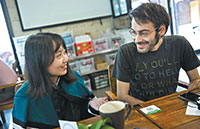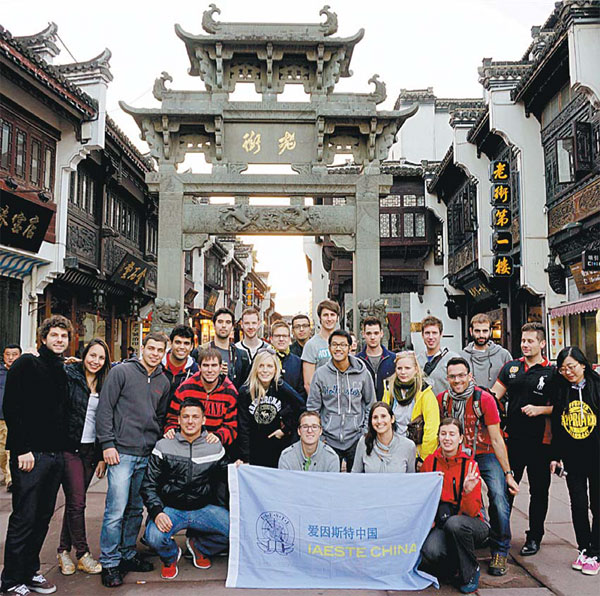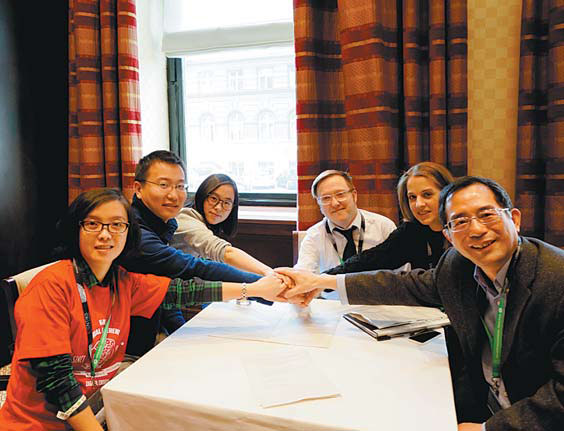Setting out on a global career path
Updated: 2015-07-24 08:09
By Chen Yingqun(China Daily Europe)
|
|||||||||||
A student exchange program connects talent and employers around the world
One of Damian Krzysztof Badziak's biggest passions is Eastern culture, especially China's, yet he says he was hesitant before traveling to the country.
"I was a little scared. I had heard weird stories about work and life in China, and felt it might not be the kind of place someone from the West like me would feel comfortable with," says Krzysztof Badziak, who studies at the Technical University of Lodz, central Poland.
|
IAESTE has arranged for about 2,000 foreign students to go to China. Photos provided to China Daily |
|
The IAESTE China team is creating a new program for short exchange visits. |
However, he now sees China in a new light after working as an intern in Maymuse, Changzhou, eastern Jiangsu province, for six months.
"I have to say that my good expectations have been met, and none of the negative stories I heard turned out to be true. I want to stay in China a lot longer, at least three more months, possibly a year, or perhaps even for the rest of my life."
Richard Wu, chairman of the International Association for the Exchange of Students for Technical Experience in China, says those comments are typical of the feedback he has received in recent months. Badziak is one example of a foreign student who comes to China to have an internship through IAESTE.
The association calls itself an independent, non-profit and non-political student exchange organization established in 1948 at Imperial College London. It provides those studying for technical degrees, mainly science, engineering and the applied arts, with paid, course-related, training abroad and employers with highly skilled, highly motivated trainees for long- or short- term projects.
The association says it has arranged exchange visits for more than 350,000 students worldwide, with 80 countries exchanging more than 4,000 trainees a year.
Wu, a graduate from the Massachusetts Institute of Technology (MIT) who later worked as a chemist in a research institute in Washington, says the program set up shop in China in 2000. Since then it has brought around 2,000 foreign students to the country and now brings in about 100 students every year. At the same time IAESTE sends the same number of Chinese students abroad for internships.
Wu says he became acquainted with the association in 1999, through a neighbor who ran the organization's operations in the United States. He realized how invaluable its work was and decided to introduce it in China.
"I have studied in the US for years, but it was only after working there that I was able to learn about its society too. The association's value lies in its ability to give people a solid professional grounding and to inform them about aspects of professional work, society, culture and family, which can help people prepare for their careers, and in some cases even change the direction of their careers."
China's education system has traditionally put too little emphasis on student creativity and professional training, Wu says, and the association wants to broaden students' horizons through contact with other cultures.
Zhang Cong, who works in the Shanghai office of the Swedish automotive company Scania Group, says the association's program has had a big impact on her career. She knew little about the company before taking part in one of the association's intern programs in 2013 when she was a university student. She realized the company's potential in China after working in the company's headquarters in Sweden and successfully applied for the job in Shanghai, supported by good reports about her internship from head office.
Wu compares the association to a highway that connects the world, now used chiefly by interns but which in future could be open to a wider range of individuals who want to improve their skills and broaden their minds. In the process, he says, the association would ensure quality control, including assessing academic and professional credentials, so the flow benefits individuals, companies and institutions.
The association's first 10 years in China were difficult, Wu says, and every year only 20 to 30 Chinese students were sent overseas, matching the number of overseas students brought to China. The main difficulty is finding Chinese companies in which overseas interns can perform well, he says.
"Any Chinese company that is going to take overseas interns needs to have an international environment, be English-speaking, understand Western culture and know how to manage projects in an international way and help maximize the use of interns' talent in three months. Few Chinese companies can do that. "
In the first few years, too, many Western interns complained that their internships failed to meet their expectations, Wu says.
"Chinese companies didn't know how to help them perform in such a short time. They made a great deal of effort but achieved little. Yes, the interns got the chance to taste nice food and experience a different culture, but they got few opportunities to contribute to projects, something that appeals to overseas interns."
But things have changed and Chinese companies are now becoming more competitive internationally. The languages and educational backgrounds of employees have also become more global.
Wu says the association in China is now creating a program called LePA (Learning through Participation and Achievement), designed with his team Angels Pique and Huang Bei and with certain Chinese companies so that even very short exchanges can benefit skilled people and employers.
"At the moment we are identifying the needs of students and companies. Even programs of just three months have proven valuable to both sides."
By creating an international working environment at home, Chinese employers and managers in the companies are more confident about working with people from diverse backgrounds as they continue to go global.
Wu says it used to be that most of those interested in China were leaders and entrepreneurs, but now young people are taking China into account when planning their careers.
"The world is super interested in China, whether they are senior people or not," Wu says. "To many people China is like a riddle. It is huge, with a long history and a large population, and the culture is very homogeneous. So people wonder what it is like.
"Moreover, career competition is now global, so young people need to prepare themselves for that, and the ambitious will definitely want to come to China."
Most of the student exchanges with China are with European countries, Wu says, and in Europe it is in China that most potential exchange students show interest.
IAESTE China now arranges about 200 student exchanges a year, a miniscule figure when you consider China's population, Wu says.
It is now working with the likes of Zhejiang University and Shanghai University on a special program in which these institutions set up scholarships for the exchange students and help the association choose from the best among them.
However, Wu says he would like more support from the Ministry of Education as the association seeks to work with the country's top universities in helping more Chinese students benefit from the program.
"It is the right time to upgrade the program to the next level," he says.
chenyingqun@chinadaily.com.cn
(China Daily European Weekly 07/24/2015 page23)
Today's Top News
Japan's Nikkei buys Financial Times in $1.3 bln deal
Greek parliament passes crucial bailout bill
Ministry: No date set for nationwide two-child policy
'Spartans' detained by Beijing police for disturbing order
Shanghai says no futures trading manipulation in FTZ
More Chinese companies become world top 500
Another month, another global heat record broken
Forbidden City enters Secret Garden for different shade
Hot Topics
Lunar probe , China growth forecasts, Emission rules get tougher, China seen through 'colored lens', International board,
Editor's Picks

|

|

|

|

|

|








